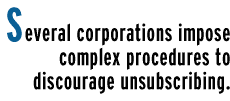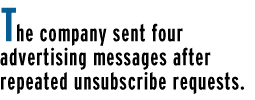| |||||||||

Got spam? Ask JCPenney.com
 JCPenney.com is one of the worst purveyors of "corporate spam" and makes it difficult for recipients to stem the tide, according to an e-commerce study. JCPenney.com is one of the worst purveyors of "corporate spam" and makes it difficult for recipients to stem the tide, according to an e-commerce study. SimplyQuick, a consumer service that tests Web shopping sites, criticizes JCPenney and seven other top e-tailers as offenders in a study of corporate spam. In an interview, SimplyQuick's CEO, Simon Smelt, said his service began the study in December 2000 by subscribing to e-mail newsletters from 41 top shopping sites. He submitted a different e-mail address to each e-tailer for tracking purposes. He then "unsubscribed" from each list after receiving a company's first e-mail. The study bent over backward to avoid crying "spam." Noting that some sites ask for three days to process requests, Smelt said that any e-mails received within four days of an unsubscribe command were deemed acceptable. Most of the e-tailers passed the unsubscribe test with flying colors. But eight of the shopping sites continued to send unwanted e-mails. In response, the study group made a new unsubscribe request after receiving each unsought message. JCPenney was named the worst offender among the eight corporate miscreants because it sent the greatest number of unwanted e-mails. The company had sent the test address four advertising messages by March 2001, even after repeated unsubscribe requests, Smelt said. And the messages were hefty graphical downloads containing numerous pictures. Asked about the study, Betty Hinds, a human resources executive for JCPenney's information technology department, said, "Apparently someone isn't doing their job. There should be a person taking care of the Web site at all times to add and subtract names, and if you don't want to get e-mails from us any more, then you shouldn't have to."
Corporate spam differs from the typical spam that Internet users often receive. Typical spam messages tend to promote get-rich-quick schemes and adult entertainment. The messages originate from companies you've never heard of and usually contain false return addresses. Corporate spam messages, by contrast, bear the names of well-known industry leaders. This makes it difficult to stop corporate spam using "spam filters." Using a filter to block all e-mails from such large companies could interfere with important business dealings. Since corporations are free to hold any opinions they like and may send e-mail to anyone who asks, freedom of speech is not at stake in prohibiting corporate spam. If unsolicited corporate e-mail becomes more widely accepted, on the other hand, a torrent could be unleashed. There are 12 million businesses in the United States alone, according to ListBazaar , a database company. If each business sent you just one e-mail per year, your inbox would receive over 32,000 messages a day. And something tells me that most businesses wouldn't limit themselves to only one message per year. Unsolicited commercial faxes are prohibited in the United States and several other countries, because fax recipients must pay for each printed page. But laws against unsolicited e-mails are spotty, although each e-mail, like a fax, costs the recipient money. The cost of delivery is built into flat-rate Internet service, and many Internet users in small towns, hotel rooms, and areas outside the United States must pay by the minute to download e-mail. A few battles against corporate spam, however, have been won. A California professor last week used that state's anti-spamming laws to obtain a $77.50 court judgment against Kozmo.com, although the newly deceased shopping site may never pay up. Kozmo's customer service number provided only a recorded message, and an e-mail request for comment went unanswered. SimplyQuick's Smelt warns that some corporate sites are treading a fine line. Smelt, who holds a Ph.D. in economics from London University, says several corporations do honor unsubscribe requests but impose complex procedures to discourage unsubscribing. Getting sales alerts by e-mail should be a consumer convenience. Unfortunately, subscribing at some corporate sites will get you more than you bargained for. Brian Livingston's Wired Watchdog column appears at CNET News.com every Friday. Do you know of a problem affecting consumers? Send info to tips@BrianLivingston.com. He'll send you a book of high-tech secrets free if you're the first to submit a tip he prints.
about the writer |
|
|||||||||||||||||||||||
|
Send us news tips | Contact Us | Corrections | Privacy Policy |
|

